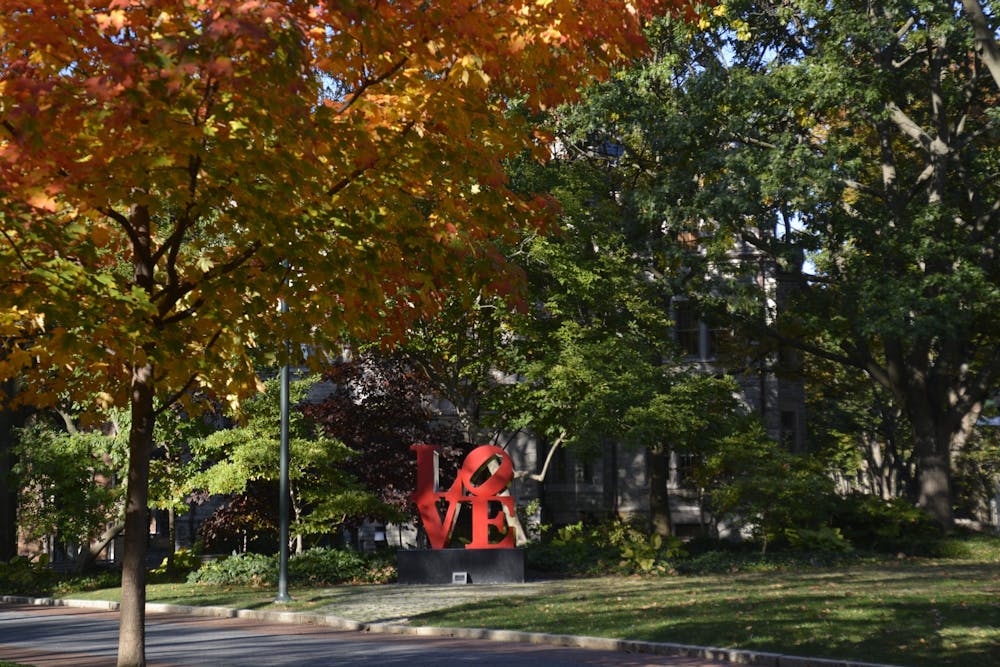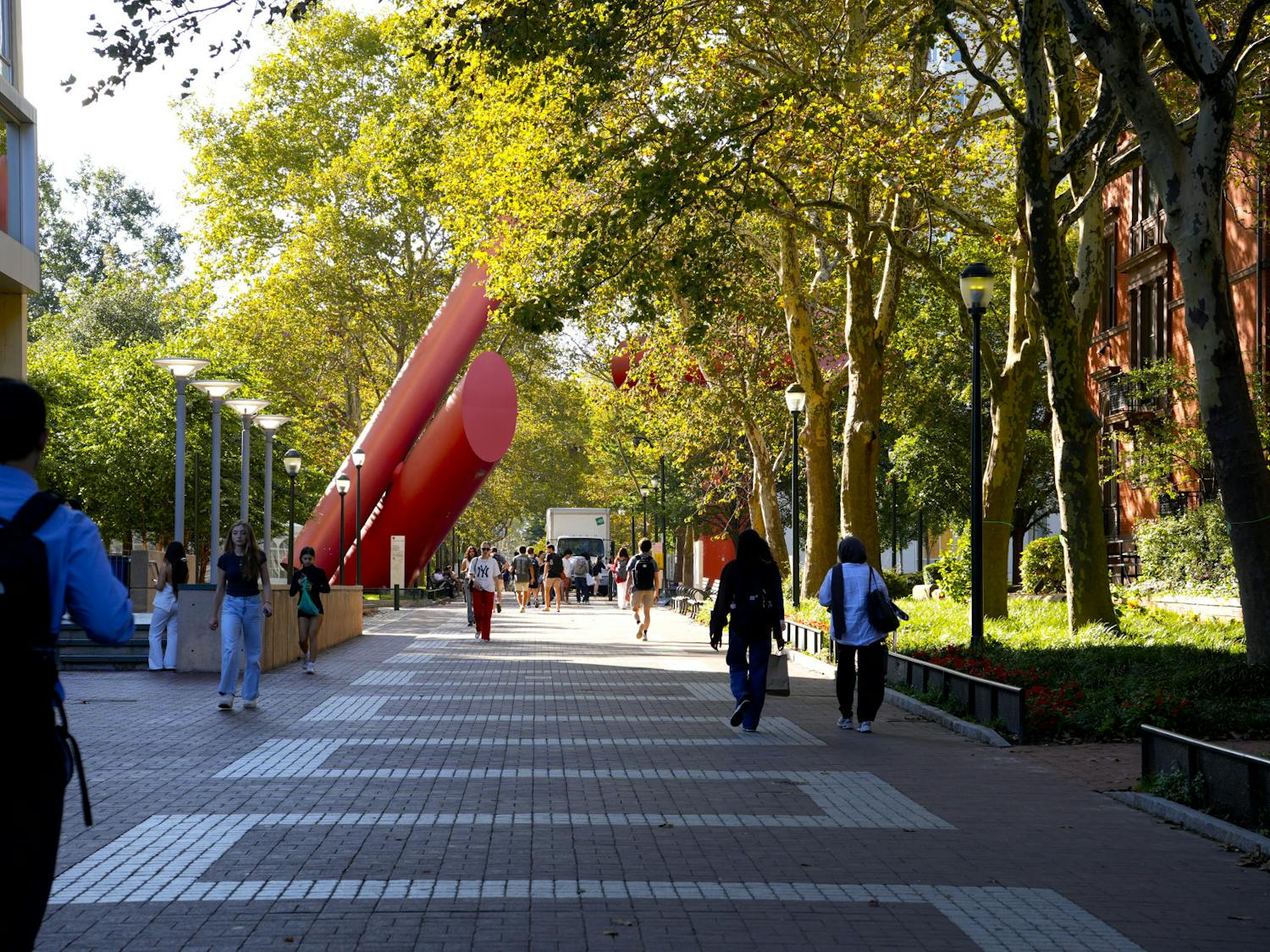Professors and lecturers are calculatedly preparing for the upcoming hybrid fall semester.
Under Penn's hybrid model, courses with more than 25 students will be recorded and taught remotely while all smaller courses may be taught in person, at the discretion of the individual professor, and with larger seating space permitted. All classes that are held in person will also be offered online so that students choosing to remain away from campus are still able to participate.
This leaves professors with a difficult decision: hold classes in person — and risk becoming infected — or teach courses remotely — and forfeit the modified in-person experience the hybrid model works to provide.
English professor Toni Bowers is one of the hundreds of professors left to make this decision about fall courses. She is scheduled to teach two courses, ENGL 090 Gender, Sexuality & Lit: Writing Women: 1660-1760 and ENGL 392 Topics In Film Studies, both of which enroll less than 25 students. Although she is permitted to hold her classes in person, Bowers will deliver both courses solely online, as she believes it is the safest and least disruptive option.
Though she said each course holds its own sets of challenges and drawbacks, she looks forward to the opportunity virtual instruction may bring.
“There’s something exciting about [online classes]. I’m able to bring in guest speakers who I could have never afforded to bring in person," she said.
Management lecturer Dana Band, who teaches one section of Wharton 201 Business Communication for Impact, which enrolls eight students, said she is also optimistic for the fall after experiencing a successful transition to virtual instruction in the spring. Band said Wharton has yet to decide if Wharton 201 will be taught in person or online.
Wharton 201 traditionally involves multiple in-person presentations which will now be recorded and submitted virtually. Students will be able to adapt to difficult circumstances and adjust to online platforms, which Band believes is an important skill to learn.
RELATED:
Penn will conduct fall 2020 on campus with hybrid of online and in-person instruction
University's retrieval policy draws mixed reactions from on-campus residents
“Everything we did in the virtual world, I do now in my consulting business. I know they have a leg up now having had this experience virtually,” Band said.

The entire Nursing School as well as some individual departments, including the Creative Writing department, have announced specific policies for how classes, regardless of size, will be conducted.
Dr. Valerie Ross, Director of the Marks Family Center for Excellence in Writing, said all writing seminar classes will operate online this fall, even though each section enrolls less than 25 students. She said the collaborative nature of the writing seminar curriculum would not lend itself to a spaced-out lecture hall with plexiglass barriers, which Penn wrote may be a precaution in some lecture spaces.
“There are some classes that have to be taught in person, but ours is not really one of them,” Ross said.
Fall writing seminar classes will be conducted through a combination of Zoom meetings and asynchronous Canvas assignments, Ross said. If significant numbers of students fall within certain time zones outside of EST, the critical writing department will consider grouping those students together for Zoom sessions, even if they are in separate writing seminar sections.
Ross considers this summer’s writing seminar courses pilots for what the fall might look like, as the courses in both terms will function online from start to finish. She is also using her experience in launching an online critical writing course through Penn’s professional studies program a year and a half ago.
Ross said she began preparing for the possibility of online instruction early last spring, when she and a few other members of the critical writing faculty met to plan how writing seminar courses would operate if Penn was forced to move classes online.
For professors of large lecture style courses, such as ECON 001 Introduction to Microeconomics, it had been clear for weeks before Penn's decision that their courses would be held online. On May 21, Penn announced four fall 2020 scenarios, all of which stated that large lectures enrolling more than 25 students would be held online.
Director of Introductory Microeconomics Anne Duchene was not at all surprised when she officially found out in June that her 230-student ECON 001 lectures would operate online. She said she instead feels lucky, as she has been recording her lectures for years and now plans to divide her recordings into shorter, more student-friendly segments as well as adding supplemental videos to explain questions she's received in her spring semester office hours.
Though she said she feels prepared to conduct the classes online, Duchene said she will miss the community that is more easily fostered through in-person interactions.
“There is an energy that I have when I teach face-to-face with students in front of me that I couldn't get if I was making new [lecture] recordings in my house just by myself,” she said.
Dick Polman, a writer in residence at the The Center for Programs in Contemporary Writing, will teach ENGL 159 Political Commentary Writing: The Presidential Election and ENGL 158 Journalistic Storytelling in the fall, which both enroll a maximum of 15 students. Polman said he is greatly concerned about the feasibility of Penn's proposed fall plan.
Polman said the hybrid model is “a great aspiration, but for a lot of instructors, it’s not workable.” Though his preference is to hold an in-person class, he is concerned about exposing himself and other students to the spread of the virus.
“No slam on students whatsoever, you all are great. It’s just that you guys are at an age where it’s inevitable that you’re going to be around each other in situations which are probably not strictly following the health guidelines. It’s just a natural thing. It’s one of the reasons you want to go to a campus like Penn is for the social aspect of it,” Polman said.
He also said that for professors who elect to teach in person, it will be difficult to pay attention to both the students in the classroom and those who are participating virtually.
“I think it’s not workable for an instructor to teach an in-person class and also to have some kind of Zoom screen at the same time. It just seems extremely high maintenance. It would be very hard to split your attention to remote and in-person people,” Polman said.

Lecturer Dwayne Booth, who will be teaching COMM 282 Sick & Satired with a capacity of 36 students, said he also has concerns about the fall hybrid model.
Booth, whose speciality is cartoons, taught COMM 292 WARNING! Graphic Content last spring, another course involving political satire, which gave him the experience of teaching "sort of inappropriate cultural explorations throughout history" through virtual platforms. Booth said it is difficult to teach this material while students were home, especially since they were often in their high school and childhood bedrooms.
“When it comes to subject matter that has the potential to be offensive, it’s best to do that in person because people can say that you’re teaching history and engaging in difficult conversations,” Booth said.
Booth also said he does not want to compromise students’ or his own health, which he believes will be a positive of the virtual format. He also said he will try to find ways to "create community" in his class, like he did in the spring with community office hours.
“[Class-wide office hours] are a way to extend that feeling of community, just like social interactions, which is such a huge part of college, so that’s like the great tragedy I think for so many students is the fact that they’ve lost that independence ,” he also said.
Though English professor Paul Hendrickson will not be teaching any classes in the fall, he wrote in an emailed statement to The Daily Pennsylvanian that he appreciates the University’s attempt to make the fall experience as close to normal as possible, but that he is concerned about the practicality of how courses will operate.
“To a large extent, the workshop students will need to Zoom and telephone and web-research their way to an authentic storytelling project,” Hendrickson wrote. “It's not an impossible task, just a much harder one. But we live in a harder universe, and there is nowhere to go but on. No use crying over what is spilt.”
Bowers said students should not be discouraged by challenges, even though it will be a difficult transition to begin a semester with a majority of classes online.
“Everytime something is new and different or there’s uncertainty, it’s just so hard. We can’t tell ourselves narratives that work [don't] anymore. We just have to make some new narratives. I hope students will decide to be optimistic. That’s what I have decided," she said.









